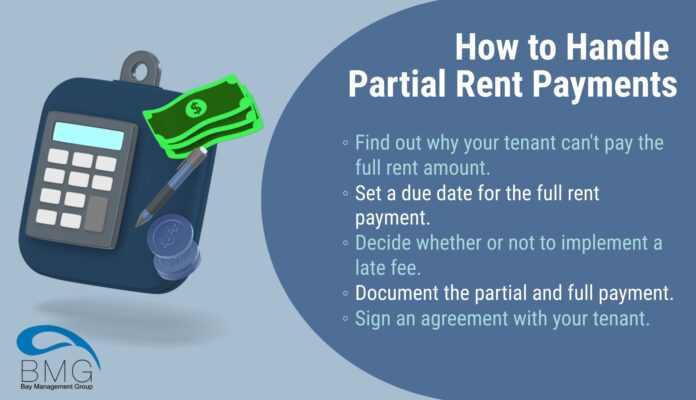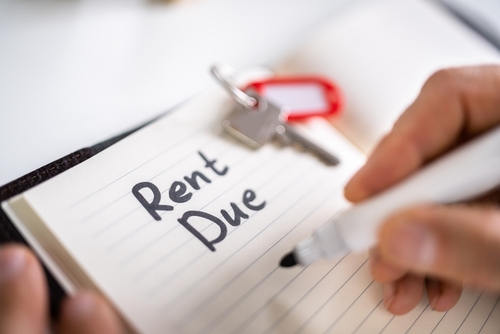How to Handle Partial Rent Payments

If you’ve been a landlord for a long time, chances are you’ve had tenants ask to make partial rent payments. While the situation is never ideal for landlords, there may be some circumstances where you let it slide. Today, we’ll review what constitutes a partial rent payment, whether or not landlords should consider them, and how to handle them when they happen.
Contents of This Article:
- What Is a Partial Rent Payment?
- Should Landlords Accept Partial Rent Payments?
- Pros and Cons of Accepting Partial Rent Payments
- How to Handle Partial Rent Payments
- Simplify Rent Collection With BMG
What Is a Partial Rent Payment?
A partial rent payment is exactly what it sounds like–a portion of the monthly rent amount. For instance, if you charge $1,500 monthly for rent and your tenant only pays $900, they gave you a partial rent payment. Now, does this mean the rent is late? Ultimately, it’s up to your discretion.
Some landlords consider partial payments late because they have not received the full amount on the due date. On the other hand, some landlords don’t label partial payments as “late” as long as they are fully paid within the accepted payment timeframe.
Why Would a Tenant Pay a Partial Amount?
There are plenty of reasons why a tenant may only pay a portion of the rent when it’s due. Here are a few that you may come across as a landlord.
- Lack of Funds- One of the most common reasons for partial rent payments is a lack of funds on the tenant’s end. If they don’t have enough for a full rent payment, they may pay as much as they can at the time and ask to pay the rest later.
- Reluctance to Pay- Rent is expensive, especially these days. So, if your tenant is frustrated with the price or simply does not want to pay in full, they may try to negotiate a partial payment.
- Ongoing Property Issues- If the property is experiencing ongoing maintenance or renovations, tenants may ask to pay a partial rent amount until it is in livable condition again.
- Unliveable Conditions- If the property does not meet living standards, tenants may withhold full rent payments until improvements are made or the property complies with local regulations.
If you’re wondering whether you or your Philadelphia property managers should accept partial rent payments, let’s review why you may or may not.
 Should Landlords Accept Partial Rent Payments?
Should Landlords Accept Partial Rent Payments?
Ultimately, it’s up to you as the landlord to decide if you want to accept partial rent payments. That said, if you do accept them, it’s important to handle them correctly. For instance, you’ll want to create an agreement with your tenant stating that they’ll pay the remainder of the rent by a certain date.
That said, if you’ve already filed for eviction, it’s in your best interest not to accept partial payments. Some states, like California, require you to restart the eviction process if you accept a partial payment after filing in court.
Additionally, to avoid discrimination claims, treating all tenants equally when deciding whether to accept partial payments is essential. If you need more help deciding whether or not to accept partial rent payments, let’s review some of the pros and cons for landlords.
Pros and Cons of Accepting Partial Rent Payments
Accepting partial rent payments can have both advantages and disadvantages for landlords. Here are a few points to consider if you’re unsure whether or not to accept a partial payment.
Pros of Partial Rent Payments
- Increased Tenant Retention- Flexibility with tenants during tough times can help maintain a positive landlord-tenant relationship, leading to longer lease terms and reduced tenant turnover.
- Maintaining Cash Flow- Accepting partial payments helps maintain at least some cash flow, as opposed to none. So, even when tenants are struggling and can’t pay the full amount, you’re at least getting some income as you wait for the remainder of the payment.
- Avoiding Vacancy or Eviction Costs- If a tenant can’t pay and you decide to evict them, you may face legal and court costs. So, accepting a partial payment can help avoid those costs and costs associated with a vacant rental unit.
Cons of Partial Rent Payments
- Increased Financial Strain- Accepting partial payments can lead to financial strain, especially if you rely heavily on rental income to cover mortgage payments, taxes, and maintenance expenses.
- May Cause Others to Pay Late- If you accept a partial payment for one tenant, you might have more tenants coming to you with partial payments, too. Continuously accepting partial payments can make it harder to enforce full, on-time payments in the future.
- Delays in the Eviction Process- As stated earlier in this article, accepting partial payments may reset the eviction process, leading to delays in regaining possession of the property if eviction is necessary.

How to Handle Partial Rent Payments
If you decide to accept partial rent payments, there are a few things you can do to safeguard yourself and ensure you get the remainder of the rent. Here are a few tips for landlords on handling partial rent payments.
- Find Out Why Your Tenant Needs It
- Set a Due Date
- Consider Implementing a Late Fee
- Document the Partial Payment
- Sign an Agreement With Your Tenant
Find Out Why Your Tenant Needs It
It’s important to understand why your tenant can’t pay the full rent amount. Open communication can give you some insight into their financial situation and allow you to determine if the issue is temporary or likely to repeat itself. Additionally, understanding their circumstances can help you decide whether to accept partial payments and if any alternative arrangements, like a temporary rent reduction or payment plan, are feasible.
Set a Due Date
If you decide to accept some rent now and some later, set a firm due date. That said, the deadline should be reasonable and aligned with your lease agreement and local laws. When you come up with a date, communicate with your tenant to ensure you’re both on the same page.
Consider Implementing a Late Fee
If your tenant pays only a portion of the rent on time, consider implementing a late fee for the remaining balance. Collecting a late fee will remind your tenant you’re serious about paying rent on time and in full.
 Document the Partial Payment
Document the Partial Payment
As a landlord, keeping detailed records of all rent payments, including partial payments, is crucial. Additionally, provide a written receipt to the tenant specifying the amount paid, the date, and any outstanding balance. Documentation helps prevent misunderstandings and disputes over rent payments. Additionally, a receipt serves as evidence in case of legal proceedings.
Sign an Agreement With Your Tenant
Create a written agreement with your tenant outlining the terms and conditions of accepting partial rent payments. Your agreement should include details like the amount of the partial payment, the remaining balance, the due date for the remainder, any applicable fees, and consequences for failure to pay the balance on time. Sign the agreement along with your tenant to signify both parties’ commitment to the terms.
Simplify Rent Collection With BMG
Collecting partial rent payments can impact your rental income. However, each circumstance is different, and it’s up to you to decide whether or not to accept them. Open communication is key to ensuring you know why your tenant is late with the rent and that they know your expectations for the remaining payment.
If you want to simplify your rent collection process, contact Bay Property Management Group. Our team of experienced property managers can help find qualified tenants who pay rent on time to ensure you receive your rental income on time and in full each month. Additionally, we can assist with any maintenance concerns or inspections you may need.
Contact BMG today to learn more about our comprehensive rental management services throughout Baltimore, Philadelphia, Northern Virginia, and Washington, DC.
Patrick Freeze
Patrick Freeze is a licensed real estate broker and Baltimore native with over a decade of experience in the real estate and property management industry. He graduated from Dickinson College before starting Bay Property Management Group in 2009. Bay Property Management Group is the ultimate property management company, specializing in a wide range of properties, including single-family houses, portfolios of rental homes, and apartment buildings. Through experience and top-notch customer service, BMG is helping make property ownership the profitable and pleasurable experience it should be.
blog search
Enjoy the latest news about BMG!
Categories
- Buying Rental Properties (68)
- Owning a Rental Property in Maryland (221)
- Owning a Rental Property in Pennsylvania (66)
- Owning a Rental Property in Virginia (64)
- PA (36)
- Property Management (207)
- Property Management Delaware County (46)
- Property Management in Anne Arundel County, MD (79)
- Property Management in Arlington (16)
- Property Management in Baltimore (205)
- Property Management in Baltimore County (39)
- Property Management In Bucks County, PA (42)
- Property Management in Carroll County, MD (33)
- Property Management in Chester County, PA (44)
- Property Management In Cumberland County, PA (13)
- Property Management in Harford County, MD (74)
- Property Management In Harrisburg (15)
- Property Management in Henrico County (8)
- Property Management in Howard County, MD (96)
- Property Management in Lancaster County, PA (12)
- Property Management in Laurel (6)
- Property Management in Leesburg (31)
- Property Management in Loudoun County (12)
- Property Management in Manassas (31)
- Property Management in Maryland (246)
- Property Management in Montgomery County, MD (101)
- Property Management In Montgomery County, PA (50)
- Property Management in Northern Virginia (101)
- Property Management in Pennsylvania (49)
- Property Management in Philadelphia (158)
- Property Management in Prince George's County, MD (88)
- Property Management in Prince William County (6)
- Property Management in Richmond (39)
- Property Management in Washington, D.C. (103)
- Property Management in York County, PA (13)
- Rental (26)
- Rental Property Marketing (21)
- Renting a Home in Maryland (34)
- Style (17)
- Tips for Investing in Rental Properties (154)
- Tips for Landlords (442)
- Tips for New Landlords (252)
- Tips for Property Managers (126)
- Tips for Tenants (50)
- Uncategorized (9)
- VA (24)
- September 2024 (19)
- August 2024 (28)
- July 2024 (26)
- June 2024 (16)
- May 2024 (20)
- April 2024 (18)
- March 2024 (18)
- February 2024 (15)
- January 2024 (20)
- December 2023 (20)
- November 2023 (22)
- October 2023 (22)
- September 2023 (20)
- August 2023 (24)
- July 2023 (22)
- June 2023 (24)
- May 2023 (24)
- April 2023 (17)
- March 2023 (20)
- February 2023 (15)
- January 2023 (21)
- December 2022 (18)
- November 2022 (23)
- October 2022 (25)
- September 2022 (24)
- August 2022 (23)
- July 2022 (18)
- June 2022 (16)
- May 2022 (15)
- April 2022 (17)
- March 2022 (16)
- February 2022 (14)
- January 2022 (16)
- December 2021 (14)
- November 2021 (13)
- October 2021 (16)
- September 2021 (16)
- August 2021 (18)
- July 2021 (16)
- June 2021 (18)
- May 2021 (14)
- April 2021 (19)
- March 2021 (17)
- February 2021 (17)
- January 2021 (13)
- December 2020 (18)
- November 2020 (19)
- October 2020 (19)
- September 2020 (13)
- August 2020 (32)
- July 2020 (59)
- June 2020 (3)
- May 2020 (25)
- April 2020 (30)
- March 2020 (4)
- February 2020 (6)
- January 2020 (8)
- December 2019 (7)
- November 2019 (2)
- October 2019 (7)
- September 2019 (6)
- August 2019 (8)
- July 2019 (6)
- June 2019 (5)
- May 2019 (5)
- April 2019 (4)
- March 2019 (6)
- February 2019 (5)
- January 2019 (3)
- December 2018 (6)
- November 2018 (6)
- October 2018 (7)
- September 2018 (7)
- August 2018 (4)
- July 2018 (2)
- May 2018 (3)
- April 2018 (1)
- February 2018 (1)
- January 2018 (1)
- December 2017 (7)
- November 2017 (11)
- October 2017 (9)
- September 2017 (9)
- August 2017 (11)
- July 2017 (11)
- June 2017 (7)
- May 2017 (7)
- April 2017 (6)
- March 2017 (9)
- February 2017 (6)
- January 2017 (6)
- December 2016 (5)
- November 2016 (6)
- October 2016 (4)
- September 2016 (6)
- August 2016 (2)
- July 2016 (3)
- June 2016 (4)
- May 2016 (5)
- April 2016 (5)
- March 2016 (7)
- February 2016 (6)
- January 2016 (5)
- December 2015 (7)
- November 2015 (5)
- October 2015 (9)
- September 2015 (7)
- August 2015 (6)
- July 2015 (11)
- June 2015 (7)
- May 2015 (1)
- April 2015 (2)
- March 2015 (1)
- November 2014 (1)
- April 2013 (2)
- February 2013 (1)
- January 2013 (1)
- December 2012 (1)
- November 2012 (1)
- October 2012 (1)
- September 2012 (1)
- August 2012 (2)
- July 2012 (1)



 Should Landlords Accept Partial Rent Payments?
Should Landlords Accept Partial Rent Payments? 
 Document the Partial Payment
Document the Partial Payment